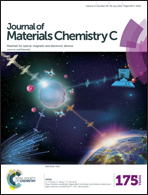Poly(pyridinium iodide ionic liquid)-based electron injection layers for solution-processed organic light-emitting devices†
Abstract
The development of electron injection materials is one of the most important steps for obtaining highly efficient low-driving-voltage organic light-emitting devices (OLEDs). In this paper, we report poly(ionic liquid) (PIL)-based electron injection layers (EILs) for solution-processed OLEDs. We synthesized poly(N-alkyl-4-vinyl-pyridinium iodide) containing three different alkyl chains (propyl, butyl, and hexyl chains) and investigated the charge-transfer interactions between the pyridinium cations and the iodide anions along with the electronic structures and thermal properties of the PILs. We also fabricated and evaluated OLEDs containing PILs as EILs. The fabricated OLEDs exhibited lower driving voltages than the conventional device containing an alkali metal complex (8-quinolinolato lithium) as the EIL. The longer alkyl chain of the PILs was more effective in reducing the driving voltage.


 Please wait while we load your content...
Please wait while we load your content...